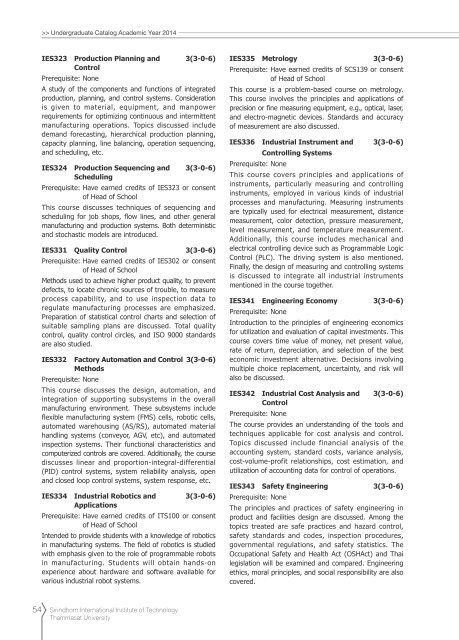undergrad2014
undergrad2014
undergrad2014
Create successful ePaper yourself
Turn your PDF publications into a flip-book with our unique Google optimized e-Paper software.
Undergraduate Catalog Academic Year 2014<br />
IES323 Production Planning and<br />
Control<br />
Prerequisite: None<br />
3(3-0-6)<br />
A study of the components and functions of integrated<br />
production, planning, and control systems. Consideration<br />
is given to material, equipment, and manpower<br />
requirements for optimizing continuous and intermittent<br />
manufacturing operations. Topics discussed include<br />
demand forecasting, hierarchical production planning,<br />
capacity planning, line balancing, operation sequencing,<br />
and scheduling, etc.<br />
IES324 Production Sequencing and<br />
Scheduling<br />
3(3-0-6)<br />
Prerequisite: Have earned credits of IES323 or consent <br />
of Head of School<br />
This course discusses techniques of sequencing and<br />
scheduling for job shops, flow lines, and other general<br />
manufacturing and production systems. Both deterministic<br />
and stochastic models are introduced.<br />
IES331 Quality Control<br />
3(3-0-6)<br />
Prerequisite: Have earned credits of IES302 or consent <br />
of Head of School<br />
Methods used to achieve higher product quality, to prevent<br />
defects, to locate chronic sources of trouble, to measure<br />
process capability, and to use inspection data to<br />
regulate manufacturing processes are emphasized.<br />
Preparation of statistical control charts and selection of<br />
suitable sampling plans are discussed. Total quality<br />
control, quality control circles, and ISO 9000 standards<br />
are also studied.<br />
IES332<br />
Prerequisite: None<br />
Factory Automation and Control 3(3-0-6)<br />
Methods<br />
This course discusses the design, automation, and<br />
integration of supporting subsystems in the overall<br />
manufacturing environment. These subsystems include<br />
flexible manufacturing system (FMS) cells, robotic cells,<br />
automated warehousing (AS/RS), automated material<br />
handling systems (conveyor, AGV, etc), and automated<br />
inspection systems. Their functional characteristics and<br />
computerized controls are covered. Additionally, the course<br />
discusses linear and proportion-integral-differential<br />
(PID) control systems, system reliability analysis, open<br />
and closed loop control systems, system response, etc.<br />
IES334 Industrial Robotics and<br />
Applications<br />
3(3-0-6)<br />
Prerequisite: Have earned credits of ITS100 or consent <br />
of Head of School<br />
Intended to provide students with a knowledge of robotics<br />
in manufacturing systems. The field of robotics is studied<br />
with emphasis given to the role of programmable robots<br />
in manufacturing. Students will obtain hands-on<br />
experience about hardware and software available for<br />
various industrial robot systems.<br />
IES335 Metrology<br />
3(3-0-6)<br />
Prerequisite: Have earned credits of SCS139 or consent <br />
of Head of School<br />
This course is a problem-based course on metrology.<br />
This course involves the principles and applications of<br />
precision or fine measuring equipment, e.g., optical, laser,<br />
and electro-magnetic devices. Standards and accuracy<br />
of measurement are also discussed.<br />
IES336 Industrial Instrument and<br />
Prerequisite: None<br />
Controlling Systems<br />
3(3-0-6)<br />
This course covers principles and applications of<br />
instruments, particularly measuring and controlling<br />
instruments, employed in various kinds of industrial<br />
processes and manufacturing. Measuring instruments<br />
are typically used for electrical measurement, distance<br />
measurement, color detection, pressure measurement,<br />
level measurement, and temperature measurement.<br />
Additionally, this course includes mechanical and<br />
electrical controlling device such as Programmable Logic<br />
Control (PLC). The driving system is also mentioned.<br />
Finally, the design of measuring and controlling systems<br />
is discussed to integrate all industrial instruments<br />
mentioned in the course together.<br />
IES341 Engineering Economy<br />
Prerequisite: None<br />
3(3-0-6)<br />
Introduction to the principles of engineering economics<br />
for utilization and evaluation of capital investments. This<br />
course covers time value of money, net present value,<br />
rate of return, depreciation, and selection of the best<br />
economic investment alternative. Decisions involving<br />
multiple choice replacement, uncertainty, and risk will<br />
also be discussed.<br />
IES342 Industrial Cost Analysis and<br />
Control<br />
Prerequisite: None<br />
3(3-0-6)<br />
The course provides an understanding of the tools and<br />
techniques applicable for cost analysis and control.<br />
Topics discussed include financial analysis of the<br />
accounting system, standard costs, variance analysis,<br />
cost-volume-profit relationships, cost estimation, and<br />
utilization of accounting data for control of operations.<br />
IES343 Safety Engineering<br />
Prerequisite: None<br />
3(3-0-6)<br />
The principles and practices of safety engineering in<br />
product and facilities design are discussed. Among the<br />
topics treated are safe practices and hazard control,<br />
safety standards and codes, inspection procedures,<br />
governmental regulations, and safety statistics. The<br />
Occupational Safety and Health Act (OSHAct) and Thai<br />
legislation will be examined and compared. Engineering<br />
ethics, moral principles, and social responsibility are also<br />
covered.<br />
54 Sirindhorn International Institute of Technology<br />
Thammasat University


